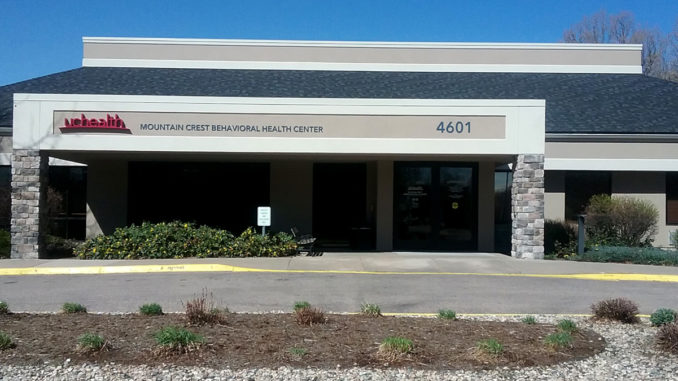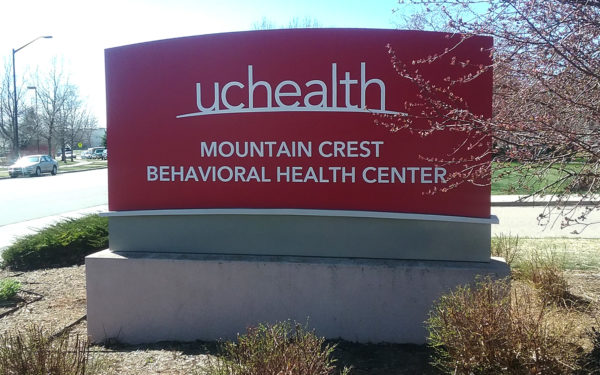

Mental illness is a reality of life. The causes vary from genetics and family history to circumstances, lifetime events and childhood patterns. “Mental illness, at any given moment, is just one incident away from all of us”, said Monica Smith, director of UCHealth Mountain Crest Behavioral Health Center. The stigma attached to the mentally ill is that they are dangerous and crazy and that there’s no getting better. Also, those of us in the “Cowboy State” of Colorado are inclined to think that mental illness is a weakness of character that a person needs to overcome on their own.
In reality, mental illness is treatable and doesn’t have to ruin your life. Treatments are varied and specific to particular needs. There are various levels of counseling and a variety of therapies available to treat different levels of mental health issues. Behaviors such as drinking or cutting, for example, can be approached with a method called Dialectic Behavioral Therapy (DBT), which teaches patients to reprogram their cognitive skill set to find better methods of coping. Other therapies include cognitive therapy and solution-focused therapy. Substance abuse issues can be successfully treated with group therapy and medication to enable the patient to maintain sobriety.
However, access to mental health care is an ongoing concern in Larimer County. As the population continues to grow, the need for all types of health care grows with it. Support and treatment have not grown to accommodate population growth, and all systems are at capacity.

So far, law enforcement has had few options to deal with mental illness other than incarceration. A good 90 percent of the homeless population is afflicted with mental illness. Too many people are unaware of this, assuming the homeless are bums who belong in jail. Laurie Stolen, the behavioral health project director of Larimer County, said jail should not be a defacto insane asylum and that the lack of the right level of care costs the county millions of dollars. Law enforcement has been overburdened with the mental health issue.
Addiction and mental illness often go hand in hand. In fact, 90 percent of suicides have both diagnosable mental illnesses and substance abuse issues. The notoriously expensive E.R. is overloaded with mental health and substance abuse cases. Larimer County has no detox facility and patients who have overdosed must be sent to Greeley.

Smith of UCHealth believes the Fort Collins community, and to some degree Weld County, have done a good job of coordinating resources to effectively bring agencies together and that northern Colorado is doing a better job of working with available resources than other parts of the state. UCHealth sponsors the mental health system as a non-profit, contributing $4 million a year to support the services. She said there is little money in the mental health field. Mental health professionals make far less than doctors or surgeons, which leads to a shortage of psychiatrists and therapists. Also, Insurance companies do not support mental health care the way they support medical care. Far more people need care than there are services for, even if insured. Mountain Crest has inpatient beds and five intensive outpatient programs: three for substance abuse, one for adolescents and one for adult psychology — all full all the time. Even those with insurance may have to wait for a month up to 12 weeks for an appointment.
Smith identifies the gaps as no residential, ongoing, in-house treatment or continuous monitoring. There are not enough intensive outpatient groups led by a licensed therapist. Without continuing care, the alcoholic, suicidal or depressed patient cannot recover. In addition, there is a lack of options for the low-income population. The Summitstone Health Partners with locations in Fort Collins and Loveland is the largest Medicaid provider in Larimer County. Smith speaks highly of the level of care at Summitstone, but she said the facilities are overloaded.
Progress is being made as the Health District, Larimer County, Weld County and law enforcement are actively working together to address the issue. Recently, the Larimer County Sheriff’s Office, Fort Collins Police Services and the Loveland Police Department have received a grant to work with the SummitStone Health Partners to create a co-responder program in which law enforcement teams with mental health care professionals on mental health-related calls. The $362,000 grant is renewable for five years.
Ultimately, Larimer County has a long way to go to meet the mental health needs of a rapidly growing population, but with continuing dialog and education, the general public can be encouraged to overcome the shame and the stigma of mental illness. This county is more than capable of meeting the challenge.
Support Northern Colorado Journalism
Show your support for North Forty News by helping us produce more content. It's a kind and simple gesture that will help us continue to bring more content to you.
BONUS - Donors get a link in their receipt to sign up for our once-per-week instant text messaging alert. Get your e-copy of North Forty News the moment it is released!
Click to Donate



